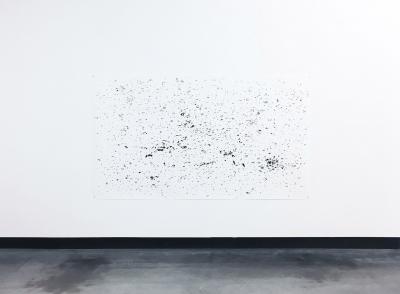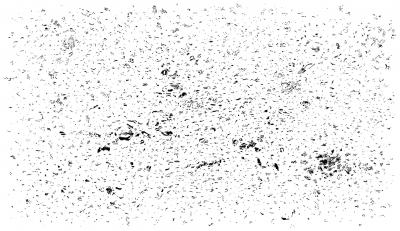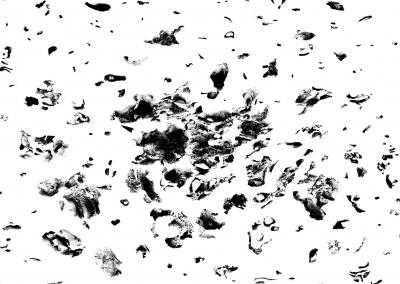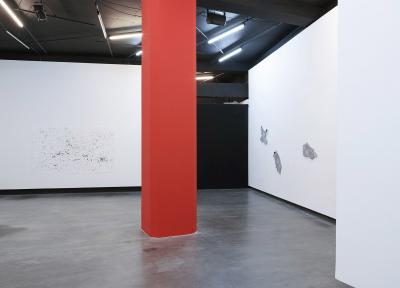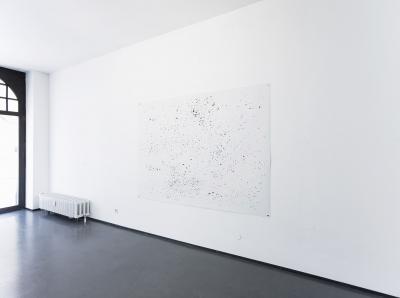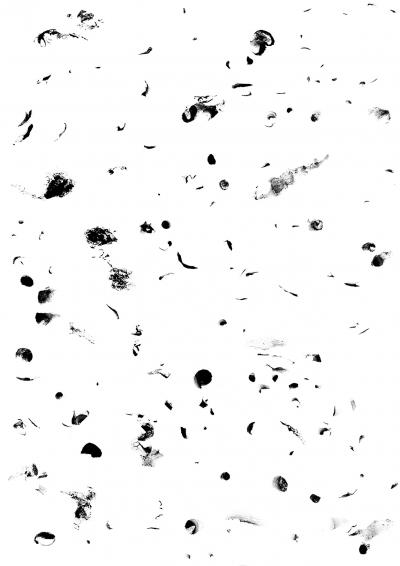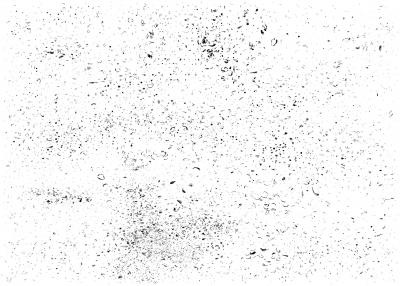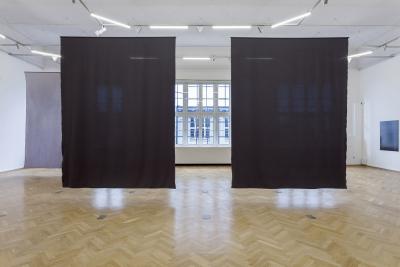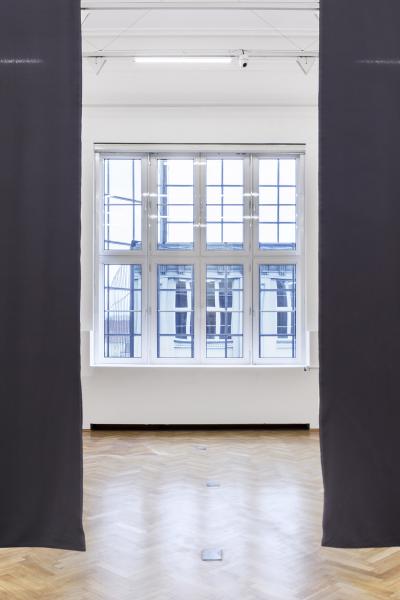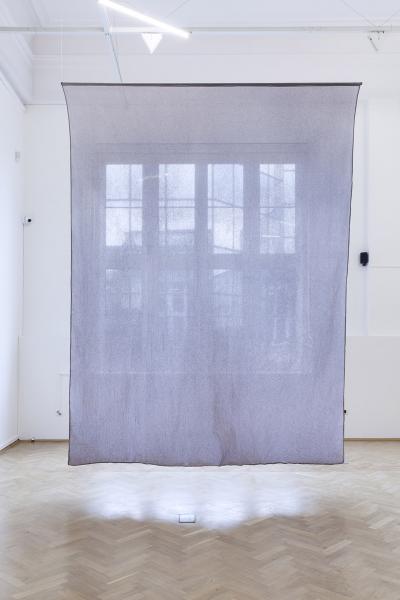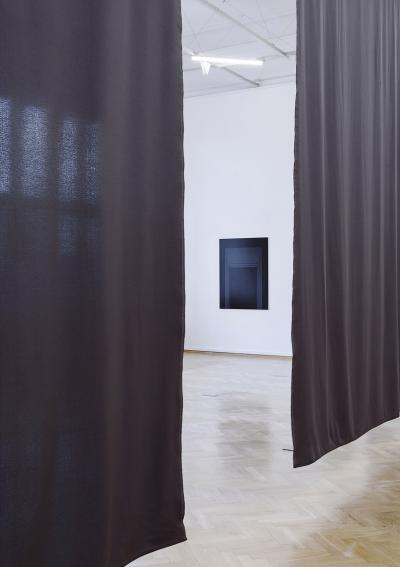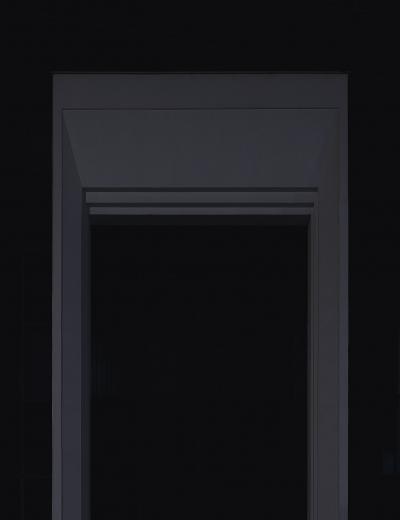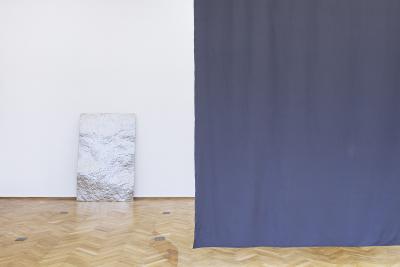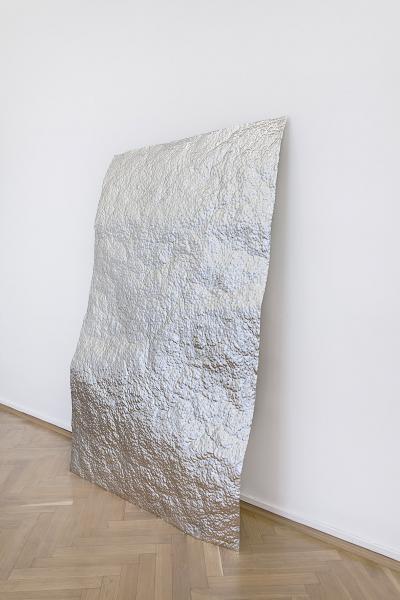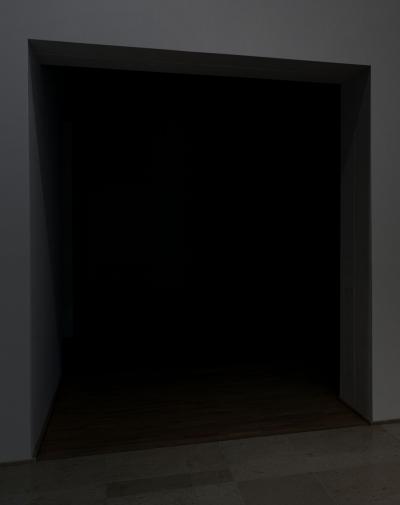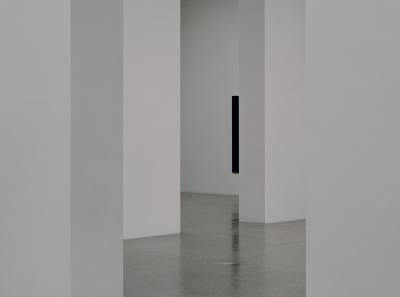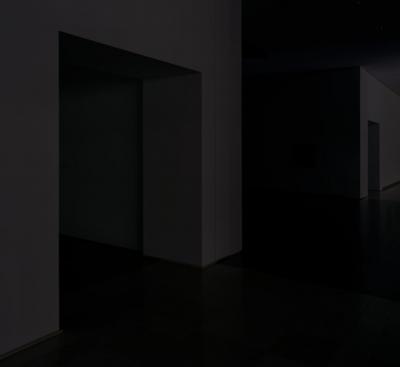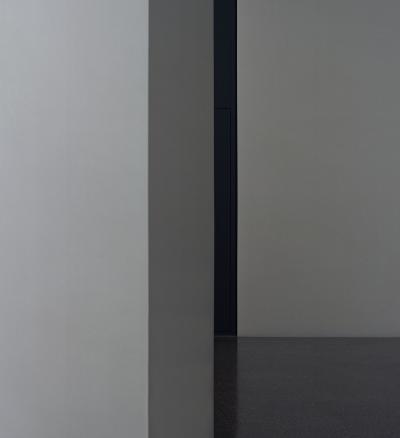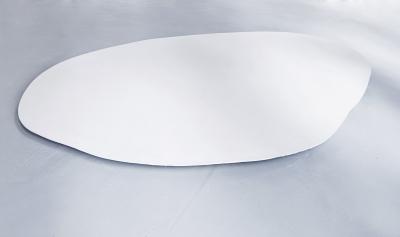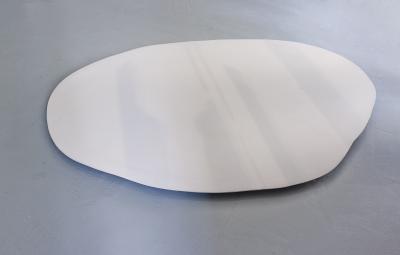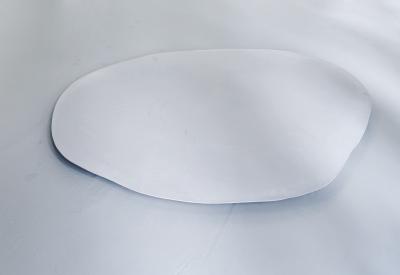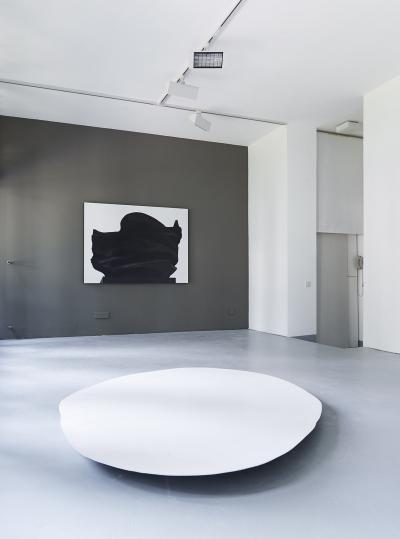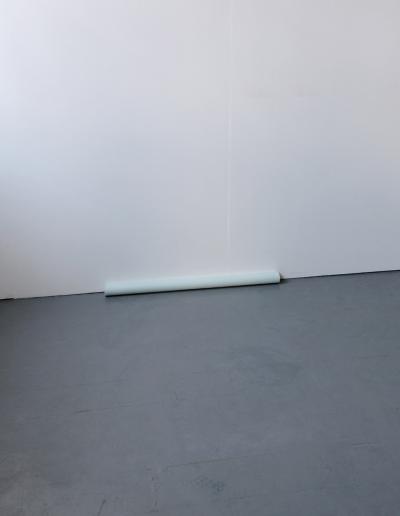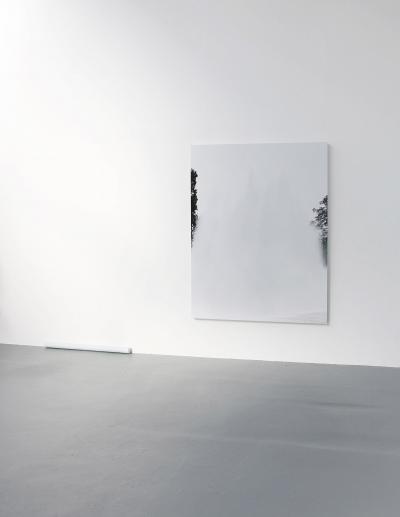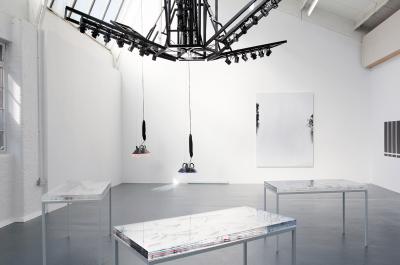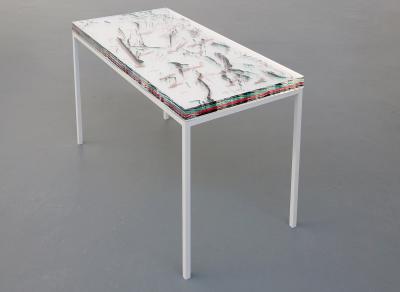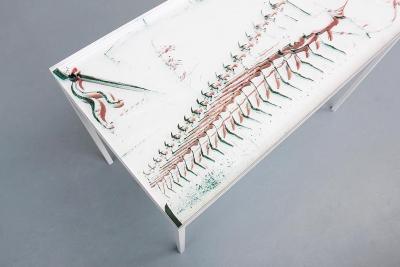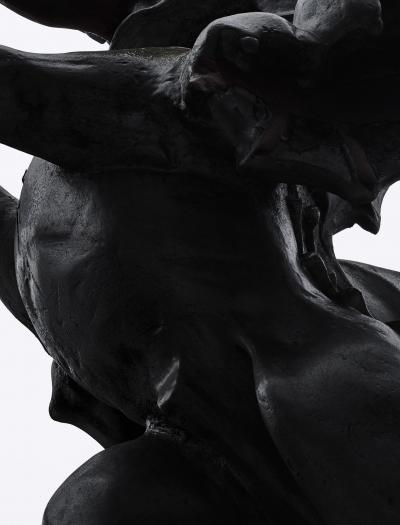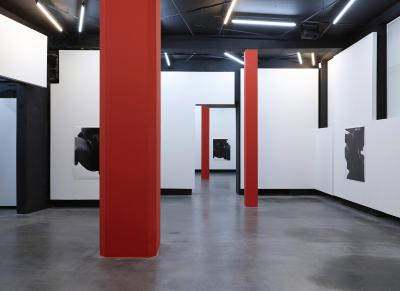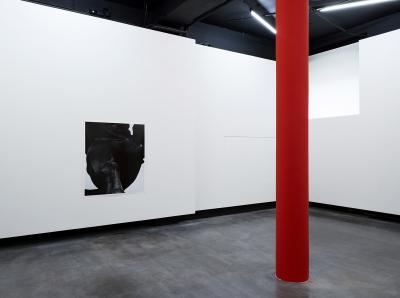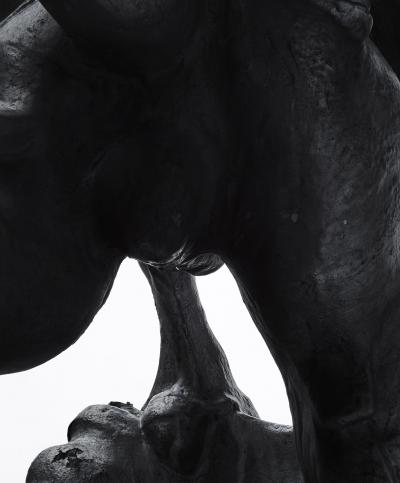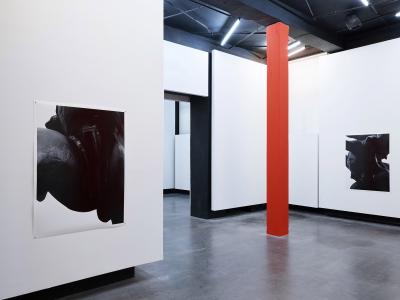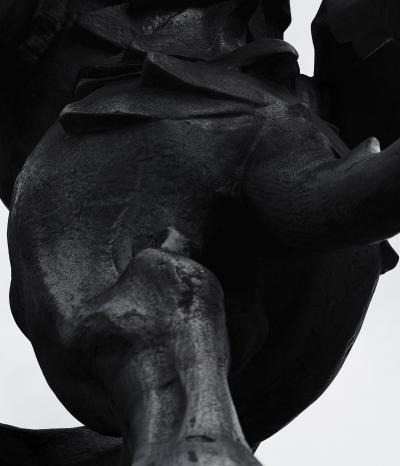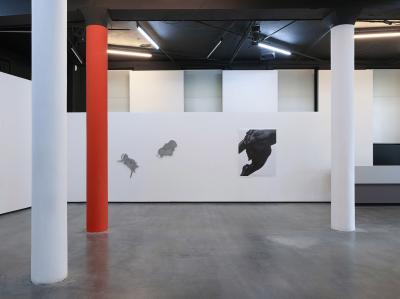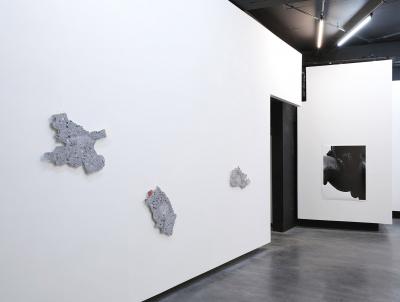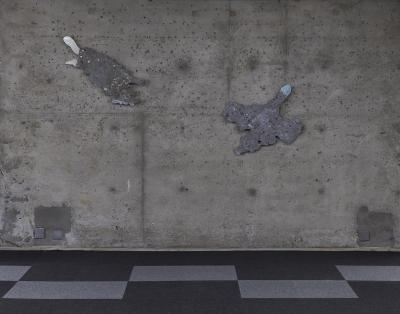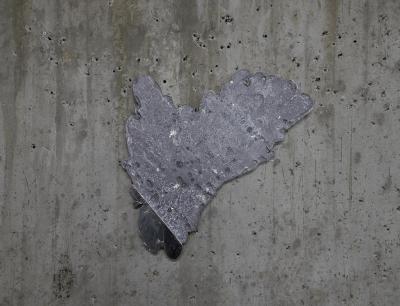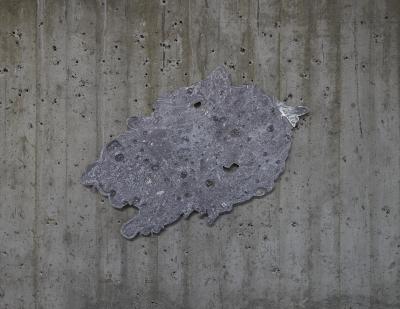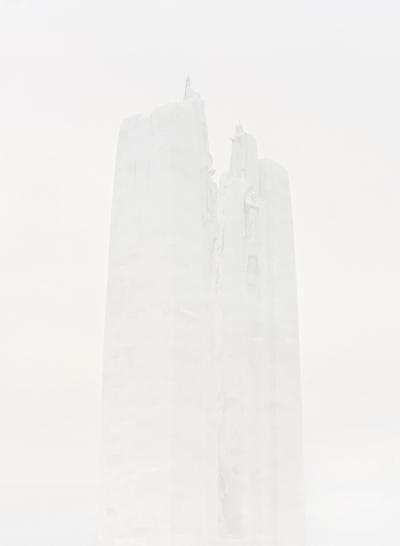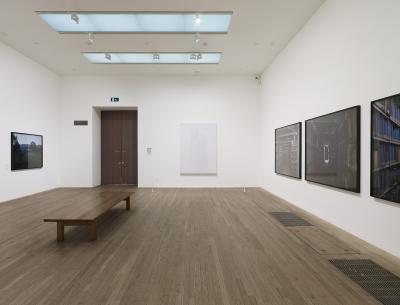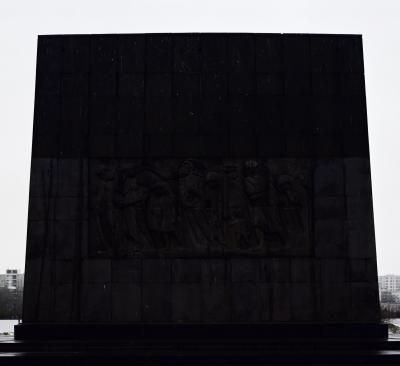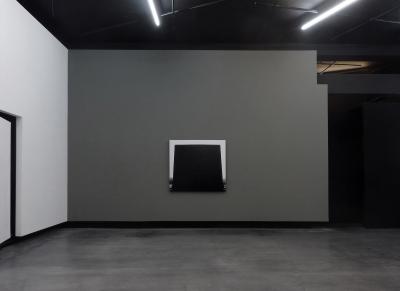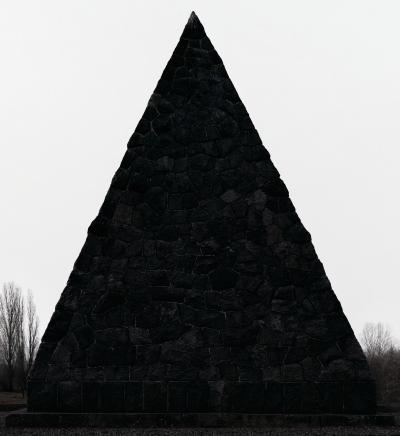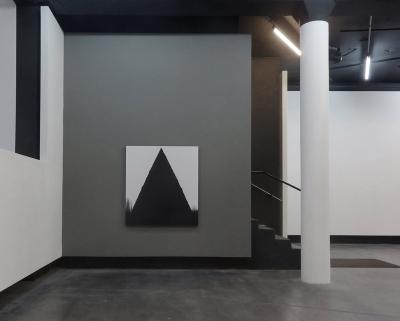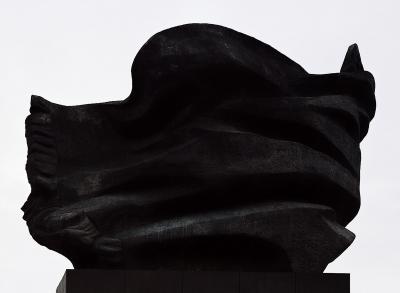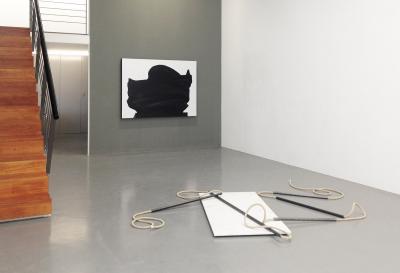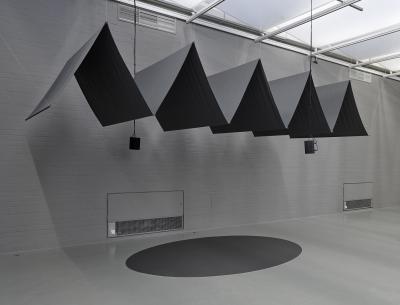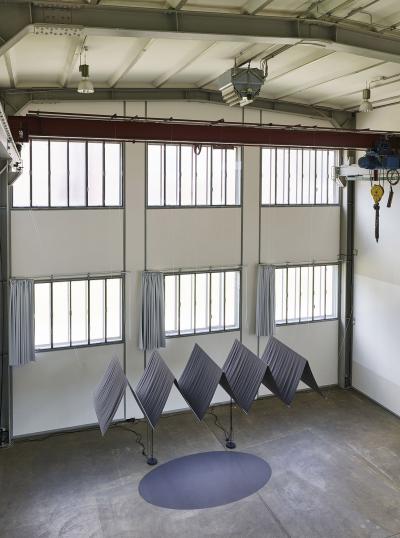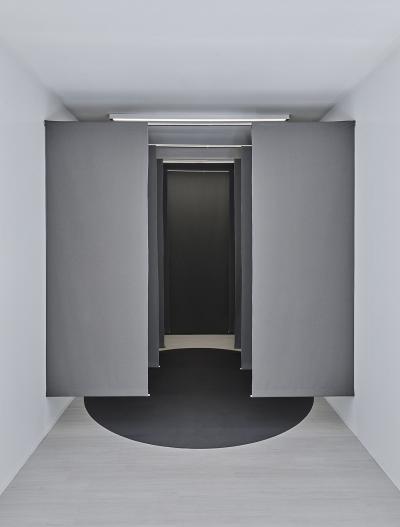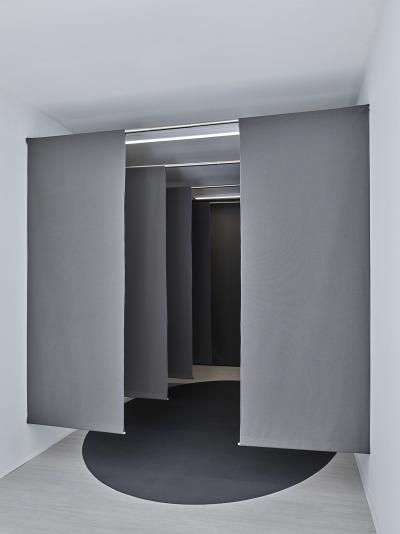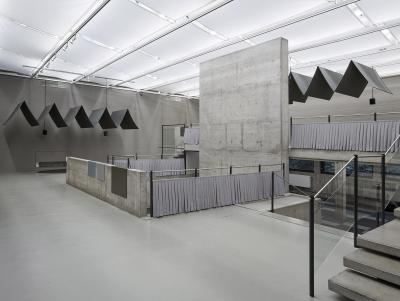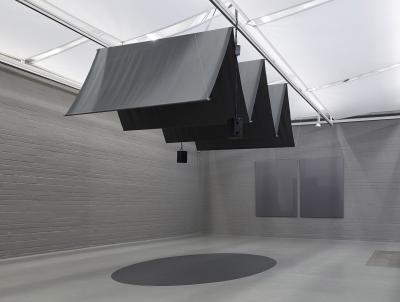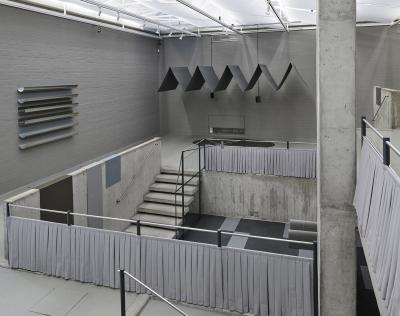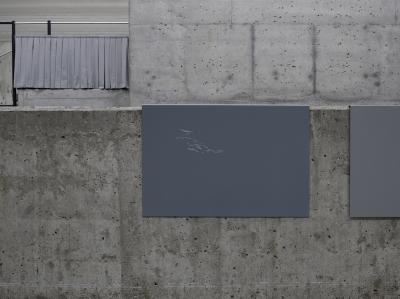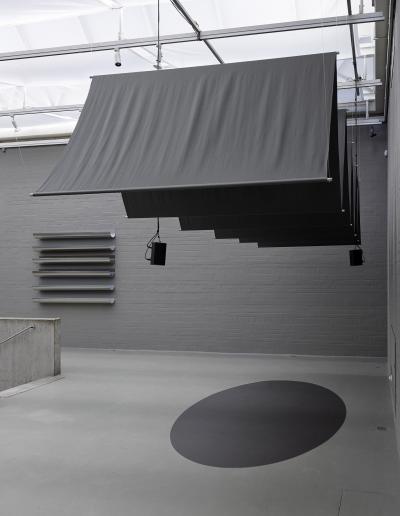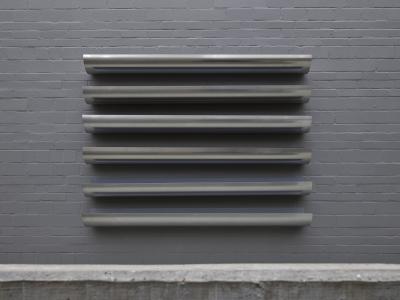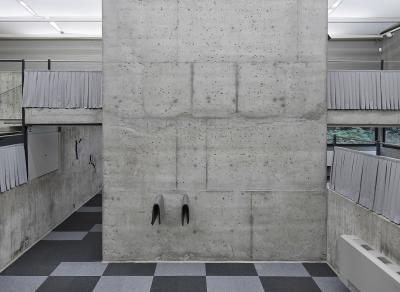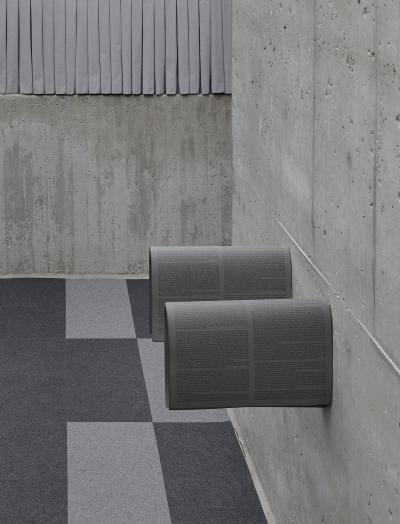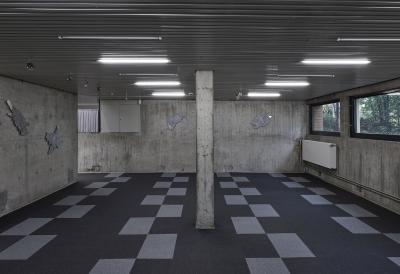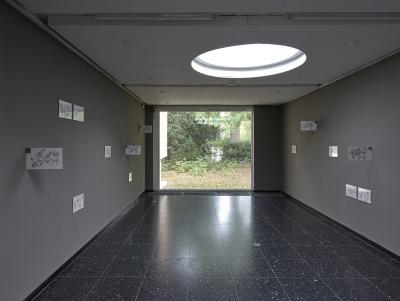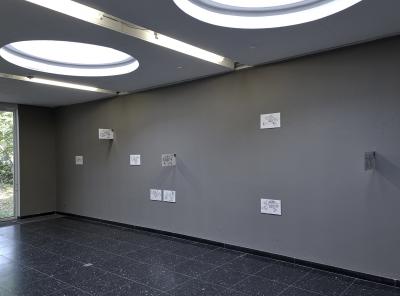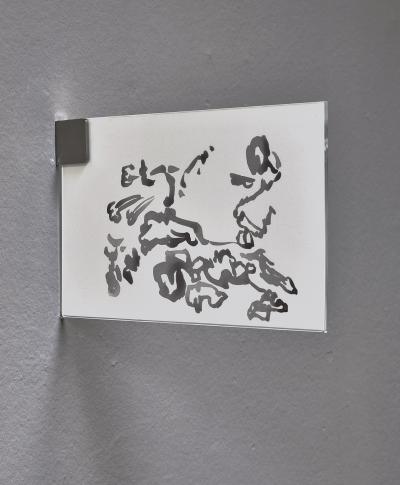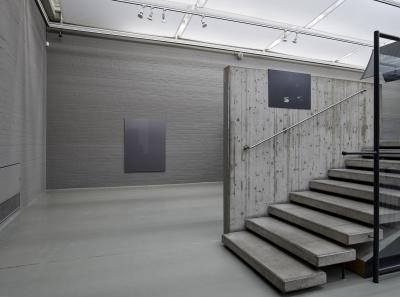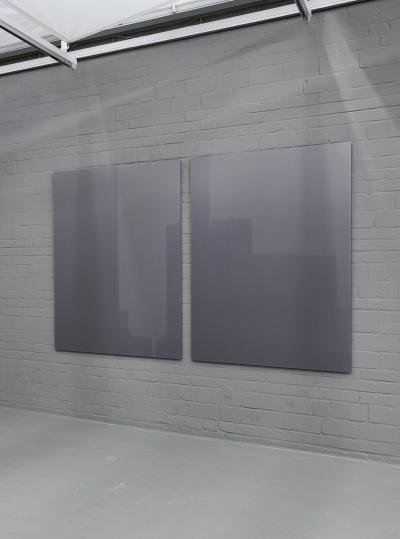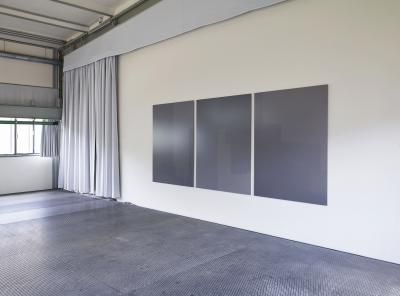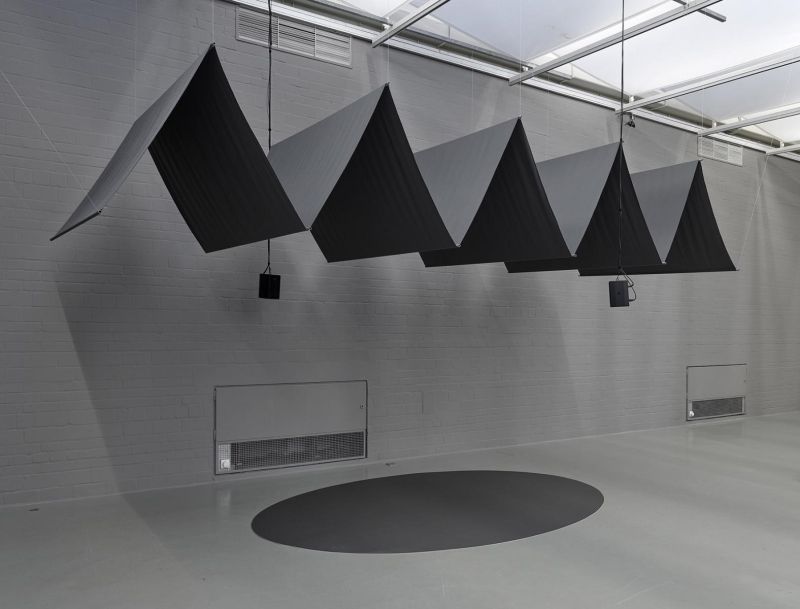Agata Madejska, DeBeers I, 2017 Agata Madejska, DeBeers I, 2017 - Agata Madejska, DeBeers I, 2017, giclée print, 150 x 260 cm. Installation view, Technocomplex, Parrotta Contemporary Art, Stuttgart. © Agata Madejska & VG Bild-Kunst http://www.bildkunst.de
Agata Madejska, DeBeers I, 2017 Agata Madejska, DeBeers I, 2017 - Agata Madejska, DeBeers I, 2017, giclée print, 150 × 260 cm. © Agata Madejska & VG Bild-Kunst http://www.bildkunst.de
Agata Madejska, DeBeers I (detail), 2017 Agata Madejska, DeBeers I (detail), 2017 - Agata Madejska, DeBeers I (detail), 2017, giclée print, 150 × 260 cm. © Agata Madejska & VG Bild-Kunst http://www.bildkunst.de
Installation view, 2017 - Installation view, Technocomplex, Parrotta Contemporary Art, Stuttgart, 2017. © Agata Madejska & VG Bild-Kunst http://www.bildkunst.de
Agata Madejska, DeBeers I, 2017
Agata Madejska, DeBeers I, 2017, giclée print, 150 x 260 cm. Installation view, Technocomplex, Parrotta Contemporary Art, Stuttgart.
Agata Madejska, DeBeers I, 2017
Agata Madejska, DeBeers I, 2017, giclée print, 150 × 260 cm.
Agata Madejska, DeBeers I (detail), 2017
Agata Madejska, DeBeers I (detail), 2017, giclée print, 150 × 260 cm.
Installation view, Technocomplex, Parrotta Contemporary Art, Stuttgart, 2017.
Agata Madejska, The Economist I, 2014 Agata Madejska, The Economist I, 2014 - Agata Madejska, The Economist I, 2014, giclée print, 150 × 210 cm. Installation view, Form Norm Folly, Krefelder Kunstverein, 2014. © Agata Madejska & VG Bild-Kunst http://www.bildkunst.de
Agata Madejska, The Economist I (detail), 2014 Agata Madejska, The Economist I (detail), 2014 - Agata Madejska, The Economist I (detail), 2014, giclée print, 150 × 210 cm. © Agata Madejska & VG Bild-Kunst http://www.bildkunst.de
Agata Madejska, The Economist I, 2014 Agata Madejska, The Economist I, 2014 - Agata Madejska, The Economist I, 2014, giclée print, 150 × 210 cm.
Agata Madejska, Near Here, Not Here, Come Here, Over Here, Right Here, Here We Are, 2017 Agata Madejska, Near Here, Not Here, Come Here, Over Here, Right Here, Here We Are, 2017 - Agata Madejska, Near Here, Not Here, Come Here, Over Here, Right Here, Here We Are, 2017 © Agata Madejska & VG Bild-Kunst http://www.bildkunst.de. Photography: Aleksandra Loska.
Agata Madejska, The Economist I, 2014
Agata Madejska, The Economist I, 2014, giclée print, 150 × 210 cm. Installation view, Form Norm Folly, Krefelder Kunstverein, 2014.
Agata Madejska, The Economist I (detail), 2014
Agata Madejska, The Economist I (detail), 2014, giclée print, 150 × 210 cm.
Agata Madejska, The Economist I, 2014
Agata Madejska, The Economist I, 2014, giclée print, 150 × 210 cm.
Agata Madejska, Near Here, Not Here, Come Here, Over Here, Right Here, Here We Are, 2017
Agata Madejska, Near Here, Not Here, Come Here, Over Here, Right Here, Here We Are, 2017
Agata Madejska, Near Here, Not Here, Come Here, Over Here, Right Here, Here We Are, 2017 Agata Madejska, Near Here, Not Here, Come Here, Over Here, Right Here, Here We Are, 2017 - Agata Madejska, Near Here, Not Here, Come Here, Over Here, Right Here, Here We Are, 2017 © Agata Madejska & VG Bild-Kunst http://www.bildkunst.de, Photography: Aleksandra Loska.
Agata Madejska, Near Here, Not Here, Come Here, Over Here, Right Here, Here We Are, 2017 Agata Madejska, Near Here, Not Here, Come Here, Over Here, Right Here, Here We Are, 2017 - Agata Madejska, Near Here, Not Here, Come Here, Over Here, Right Here, Here We Are, 2017 © Agata Madejska & VG Bild-Kunst http://www.bildkunst.de. Photography: Aleksandra Loska.
Agata Madejska, Front: Near Here, Not Here, Come Here, Over Here, Right Here, Here We Are, 2017 Agata Madejska, Front: Near Here, Not Here, Come Here, Over Here, Right Here, Here We Are, 2017 - Agata Madejska, Front: Near Here, Not Here, Come Here, Over Here, Right Here, Here We Are, 2017 © Agata Madejska & VG Bild-Kunst http://www.bildkunst.de. Photography: Aleksandra Loska.
Agata Madejska, Every City Has Its Echo, 2017 Agata Madejska, Every City Has Its Echo, 2017 - Agata Madejska, Every City Has Its Echo, 2017, giclée print on aluminium, 100 Å~ 130 cm. © Agata Madejska & VG Bild-Kunst http://www.bildkunst.de
Agata Madejska, Near Here, Not Here, Come Here, Over Here, Right Here, Here We Are, 2017
Agata Madejska, Near Here, Not Here, Come Here, Over Here, Right Here, Here We Are, 2017
Agata Madejska, Near Here, Not Here, Come Here, Over Here, Right Here, Here We Are, 2017
Agata Madejska, Near Here, Not Here, Come Here, Over Here, Right Here, Here We Are, 2017
Agata Madejska, Front: Near Here, Not Here, Come Here, Over Here, Right Here, Here We Are, 2017
Agata Madejska, Front: Near Here, Not Here, Come Here, Over Here, Right Here, Here We Are, 2017
Agata Madejska, Every City Has Its Echo, 2017
Agata Madejska, Every City Has Its Echo, 2017, giclée print on aluminium, 100 Å~ 130 cm.
Agata Madejska, Front: Near Here, Not Here, Come Here, Over Here, Right Here, Here We Are, 2017 Agata Madejska, Front: Near Here, Not Here, Come Here, Over Here, Right Here, Here We Are, 2017 - Agata Madejska, Front: Near Here, Not Here, Come Here, Over Here, Right Here, Here We Are, 2017 © Agata Madejska & VG Bild-Kunst http://www.bildkunst.de. Photography: Aleksandra Loska.
Agata Madejska, 18 Minutes, 2017 Agata Madejska, 18 Minutes, 2017 - Agata Madejska, 18 Minutes, 2017, aluminium, 200 x 125 x 0,5 cm. © Agata Madejska & VG Bild-Kunst http://www.bildkunst.de. Photography: Aleksandra Loska.
Agata Madejska, Entrance, 2011 Agata Madejska, Entrance, 2011 - Agata Madejska, Entrance, 2011, part of the photo essay Temporary or Permanent, published in: Museum Folkwang. Die Architektur, Edition Folkwang, Steidl, Göttingen, 2012. © Agata Madejska & VG Bild-Kunst http://www.bildkunst.de
Agata Madejska, Space II, 2011 Agata Madejska, Space II, 2011 - Agata Madejska, Space II, 2011, part of the photo essay Temporary or Permanent, published in: Museum Folkwang. Die Architektur, Edition Folkwang, Steidl, Göttingen, 2012. © Agata Madejska & VG Bild-Kunst http://www.bildkunst.de
Agata Madejska, Front: Near Here, Not Here, Come Here, Over Here, Right Here, Here We Are, 2017
Agata Madejska, Front: Near Here, Not Here, Come Here, Over Here, Right Here, Here We Are, 2017
Agata Madejska, 18 Minutes, 2017
Agata Madejska, 18 Minutes, 2017, aluminium, 200 x 125 x 0,5 cm.
Agata Madejska, Entrance, 2011
Agata Madejska, Entrance, 2011, part of the photo essay Temporary or Permanent, published in: Museum Folkwang. Die Architektur, Edition Folkwang, Steidl, Göttingen, 2012.
Agata Madejska, Space II, 2011
Agata Madejska, Space II, 2011, part of the photo essay Temporary or Permanent, published in: Museum Folkwang. Die Architektur, Edition Folkwang, Steidl, Göttingen, 2012.
Agata Madejska, Corridor, 2011 Agata Madejska, Corridor, 2011 - Agata Madejska, Corridor, 2011, part of the photo essay Temporary or Permanent, published in: Museum Folkwang. Die Architektur, Edition Folkwang, Steidl, Göttingen, 2012. © Agata Madejska & VG Bild-Kunst http://www.bildkunst.de
Agata Madejska, Space I, 2011 Agata Madejska, Space I, 2011 - Agata Madejska, Space I, 2011, part of the photo essay Temporary or Permanent, published in: Museum Folkwang. Die Architektur, Edition Folkwang, Steidl, Göttingen, 2012. © Agata Madejska & VG Bild-Kunst http://www.bildkunst.de
Agata Madejska, unexposed: From Now On (Folly), 2014 Agata Madejska, unexposed: From Now On (Folly), 2014 - Agata Madejska, unexposed: From Now On (Folly), 2014, photosensitive emulsion, jesmonite, 160 x 250 cm. Installation view, Form Norm Folly, Krefelder Kunstverein, 2014.
Agata Madejska, first day of exposure: From Now On (Folly), 2014 Agata Madejska, first day of exposure: From Now On (Folly), 2014 - Agata Madejska, first day of exposure: From Now On (Folly), 2014, photosensitive emulsion, jesmonite, 160 x 250 cm. Installation view, Form Norm Folly, Krefelder Kunstverein, 2014. © Agata Madejska & VG Bild-Kunst http://www.bildkunst.de
Agata Madejska, Corridor, 2011
Agata Madejska, Corridor, 2011, part of the photo essay Temporary or Permanent, published in: Museum Folkwang. Die Architektur, Edition Folkwang, Steidl, Göttingen, 2012.
Agata Madejska, Space I, 2011
Agata Madejska, Space I, 2011, part of the photo essay Temporary or Permanent, published in: Museum Folkwang. Die Architektur, Edition Folkwang, Steidl, Göttingen, 2012.
Agata Madejska, unexposed: From Now On (Folly), 2014
Agata Madejska, unexposed: From Now On (Folly), 2014, photosensitive emulsion, jesmonite, 160 x 250 cm. Installation view, Form Norm Folly, Krefelder Kunstverein, 2014.
Agata Madejska, first day of exposure: From Now On (Folly), 2014
Agata Madejska, first day of exposure: From Now On (Folly), 2014, photosensitive emulsion, jesmonite, 160 x 250 cm. Installation view, Form Norm Folly, Krefelder Kunstverein, 2014.
Agata Madejska, 5th day of exposure: From Now On (Folly), 2014 Agata Madejska, 5th day of exposure: From Now On (Folly), 2014 - Agata Madejska, 5th day of exposure: From Now On (Folly), 2014, photosensitive emulsion, jesmonite, 160 x 250 cm. Installation view, Form Norm Folly, Krefelder Kunstverein, 2014. © Agata Madejska & VG Bild-Kunst http://www.bildkunst.de
Agata Madejska, Installation view, Form Norm Folly, Krefelder Kunstverein, 2014 Agata Madejska, Installation view, Form Norm Folly, Krefelder Kunstverein, 2014 - Agata Madejska, Installation view, Form Norm Folly, Krefelder Kunstverein, 2014. © Agata Madejska & VG Bild-Kunst http://www.bildkunst.de
vAgata Madejska, For Now (Folly), 2015 vAgata Madejska, For Now (Folly), 2015 - Agata Madejska, For Now (Folly), 2015, concrete, photochromic paint, 100 x 6 x 6 cm. © Agata Madejska & VG Bild-Kunst http://www.bildkunst.de
Agata Madejska, Installation view, Kingly Things, Coco Crampton & Agata Madejska at Chandelier Projects, London, 2015 Agata Madejska, Installation view, Kingly Things, Coco Crampton & Agata Madejska at Chandelier Projects, London, 2015 - Agata Madejska, Installation view, Kingly Things, Coco Crampton & Agata Madejska at Chandelier Projects, London, 2015. © Agata Madejska & VG Bild-Kunst http://www.bildkunst.de
Agata Madejska, 5th day of exposure: From Now On (Folly), 2014
Agata Madejska, 5th day of exposure: From Now On (Folly), 2014, photosensitive emulsion, jesmonite, 160 x 250 cm. Installation view, Form Norm Folly, Krefelder Kunstverein, 2014.
Agata Madejska, Installation view, Form Norm Folly, Krefelder Kunstverein, 2014
Agata Madejska, Installation view, Form Norm Folly, Krefelder Kunstverein, 2014.
vAgata Madejska, For Now (Folly), 2015
Agata Madejska, For Now (Folly), 2015, concrete, photochromic paint, 100 x 6 x 6 cm.
Agata Madejska, Installation view, Kingly Things, Coco Crampton & Agata Madejska at Chandelier Projects, London, 2015
Agata Madejska, Installation view, Kingly Things, Coco Crampton & Agata Madejska at Chandelier Projects, London, 2015.
Agata Madejska, Installation view, Kingly Things, Coco Crampton & Agata Madejska at Chandelier Projects, London, 2015 Agata Madejska, Installation view, Kingly Things, Coco Crampton & Agata Madejska at Chandelier Projects, London, 2015 - Agata Madejska, Installation view, Kingly Things, Coco Crampton & Agata Madejska at Chandelier Projects, London, 2015. © Agata Madejska & VG Bild-Kunst http://www.bildkunst.de
Agata Madejska, FACTUM, 2014 Agata Madejska, FACTUM, 2014 - Agata Madejska, FACTUM, 2014, UV-print on perspex, paper, powder-coated steel frame, 50 x 100 x 60 cm (one of sixteen). © Agata Madejska & VG Bild-Kunst http://www.bildkunst.de
Agata Madejska, FACTUM (detail), 2014 Agata Madejska, FACTUM (detail), 2014 - Agata Madejska, FACTUM (detail), 2014, UV-print on perspex, paper, powder-coated steel frame, 50 x 100 x 60 cm (one of sixteen). © Agata Madejska & VG Bild-Kunst http://www.bildkunst.de
Agata Madejska, Tender Offer (Holborn II), 2017 Agata Madejska, Tender Offer (Holborn II), 2017 - Agata Madejska, Tender Offer (Holborn II), 2017, giclée print, 99 x 130 cm. © Agata Madejska & VG Bild-Kunst http://www.bildkunst.de
Agata Madejska, Installation view, Kingly Things, Coco Crampton & Agata Madejska at Chandelier Projects, London, 2015
Agata Madejska, Installation view, Kingly Things, Coco Crampton & Agata Madejska at Chandelier Projects, London, 2015.
Agata Madejska, FACTUM, 2014
Agata Madejska, FACTUM, 2014, UV-print on perspex, paper, powder-coated steel frame, 50 x 100 x 60 cm (one of sixteen).
Agata Madejska, FACTUM (detail), 2014
Agata Madejska, FACTUM (detail), 2014, UV-print on perspex, paper, powder-coated steel frame, 50 x 100 x 60 cm (one of sixteen).
Agata Madejska, Tender Offer (Holborn II), 2017
Agata Madejska, Tender Offer (Holborn II), 2017, giclée print, 99 x 130 cm.
Agata Madejska, Installation view, 2017 Agata Madejska, Installation view, 2017 - Agata Madejska, Installation view, Technocomplex, Parrotta Contemporary Art, Stuttgart, 2017. © Agata Madejska & VG Bild-Kunst http://www.bildkunst.de
Agata Madejska, Installation view, 2017 Agata Madejska, Installation view, 2017 - Agata Madejska, Installation view, Technocomplex, Parrotta Contemporary Art, Stuttgart, 2017. © Agata Madejska & VG Bild-Kunst http://www.bildkunst.de
Agata Madejska, Tender Offer (Goswell Road), 2017 Agata Madejska, Tender Offer (Goswell Road), 2017 - Agata Madejska, Tender Offer (Goswell Road), 2017, giclée print, 107 x 130 cm. © Agata Madejska & VG Bild-Kunst http://www.bildkunst.de
Agata Madejska, Installation view, 2017 Agata Madejska, Installation view, 2017 - Agata Madejska, Installation view, Technocomplex, Parrotta Contemporary Art, Stuttgart, 2017. © Agata Madejska & VG Bild-Kunst http://www.bildkunst.de
Agata Madejska, Installation view, 2017
Agata Madejska, Installation view, Technocomplex, Parrotta Contemporary Art, Stuttgart, 2017.
Agata Madejska, Installation view, 2017
Agata Madejska, Installation view, Technocomplex, Parrotta Contemporary Art, Stuttgart, 2017.
Agata Madejska, Tender Offer (Goswell Road), 2017
Agata Madejska, Tender Offer (Goswell Road), 2017, giclée print, 107 x 130 cm.
Agata Madejska, Installation view, 2017
Agata Madejska, Installation view, Technocomplex, Parrotta Contemporary Art, Stuttgart, 2017.
Agata Madejska, Tender Offer (Farringdon), 2017 Agata Madejska, Tender Offer (Farringdon), 2017 - Agata Madejska, Tender Offer (Farringdon), 2017, giclée print, 111,5 x 130 cm. © Agata Madejska & VG Bild-Kunst http://www.bildkunst.de
Agata Madejska, Installation view, 2017 Agata Madejska, Installation view, 2017 - Agata Madejska, Installation view, Technocomplex, Parrotta Contemporary Art, Stuttgart, 2017. © Agata Madejska & VG Bild-Kunst http://www.bildkunst.de
Agata Madejska, Installation view, 2017 Agata Madejska, Installation view, 2017 - Agata Madejska, Installation view, Technocomplex, Parrotta Contemporary Art, Stuttgart, 2017. © Agata Madejska & VG Bild-Kunst http://www.bildkunst.de
Agata Madejska, Technocomplex, 2017 Agata Madejska, Technocomplex, 2017 - Agata Madejska, Technocomplex, 2017, light sensitive coating, pewter, installation view at Kunsthalle Wilhelmshaven, 2018. © Agata Madejska & VG Bild-Kunst http://www.bildkunst.de
Agata Madejska, Tender Offer (Farringdon), 2017
Agata Madejska, Tender Offer (Farringdon), 2017, giclée print, 111,5 x 130 cm.
Agata Madejska, Installation view, 2017
Agata Madejska, Installation view, Technocomplex, Parrotta Contemporary Art, Stuttgart, 2017.
Agata Madejska, Installation view, 2017
Agata Madejska, Installation view, Technocomplex, Parrotta Contemporary Art, Stuttgart, 2017.
Agata Madejska, Technocomplex, 2017
Agata Madejska, Technocomplex, 2017, light sensitive coating, pewter, installation view at Kunsthalle Wilhelmshaven, 2018.
Agata Madejska, Technocomplex 004, 2017 Agata Madejska, Technocomplex 004, 2017 - Agata Madejska, Technocomplex 004, 2017, light sensitive coating, pewter, 50 x 66 x 1 cm. © Agata Madejska & VG Bild-Kunst http://www.bildkunst.de
Agata Madejska, Technocomplex 004, 2017 Agata Madejska, Technocomplex 004, 2017 - Agata Madejska, Technocomplex 004, 2017, light sensitive coating, pewter, 57 x 65 x 1 cm. © Agata Madejska & VG Bild-Kunst http://www.bildkunst.de
Agata Madejska, 25-36, 2010 Agata Madejska, 25-36, 2010 - Agata Madejska, 25-36, 2010, lightjet c-type print on Forex and varnished MDF, 160 x 220 x 5 cm. © Agata Madejska & VG Bild-Kunst http://www.bildkunst.de
Agata Madejska, 25-36, 2010 Agata Madejska, 25-36, 2010 - Agata Madejska, 25-36, 2010, lightjet c-type print on Forex and varnished MDF, 160 x 220 x 5 cm. Installation view, Conflict, Time, Photography, Tate Modern, London, 2014. © Agata Madejska & VG Bild-Kunst http://www.bildkunst.de
Agata Madejska, Technocomplex 004, 2017
Agata Madejska, Technocomplex 004, 2017, light sensitive coating, pewter, 50 x 66 x 1 cm.
Agata Madejska, Technocomplex 004, 2017
Agata Madejska, Technocomplex 004, 2017, light sensitive coating, pewter, 57 x 65 x 1 cm.
Agata Madejska, 25-36, 2010
Agata Madejska, 25-36, 2010, lightjet c-type print on Forex and varnished MDF, 160 x 220 x 5 cm.
Agata Madejska, 25-36, 2010
Agata Madejska, 25-36, 2010, lightjet c-type print on Forex and varnished MDF, 160 x 220 x 5 cm. Installation view, Conflict, Time, Photography, Tate Modern, London, 2014.
Agata Madejska, 46-48, 2010 Agata Madejska, 46-48, 2010 - Agata Madejska, 46-48, 2010, lightjet c-type print on Forex and waxed MDF, 119 x 130 x 5 cm. © Agata Madejska & VG Bild-Kunst http://www.bildkunst.de
Agata Madejska, 46-48, 2010 Agata Madejska, 46-48, 2010 - Agata Madejska, 46-48, 2010, lightjet c-type print on Forex and waxed MDF, 119 x 130 x 5 cm. Installation view, Parrotta Contemporary Art, Stuttgart, 2013. © Agata Madejska & VG Bild-Kunst http://www.bildkunst.de
Agata Madejska, 1906, 2012 Agata Madejska, 1906, 2012 - Agata Madejska, 1906, 2012, lightjet c-type print on Forex and waxed MDF, 119 x 130 x 5 cm. © Agata Madejska & VG Bild-Kunst http://www.bildkunst.de
Agata Madejska, 1906, 2012 Agata Madejska, 1906, 2012 - Agata Madejska, 1906, 2012, lightjet c-type print on Forex and waxed MDF, 119 x 130 x 5 cm. Installation view, Parrotta Contemporary Art, Stuttgart, 2013. © Agata Madejska & VG Bild-Kunst http://www.bildkunst.de
Agata Madejska, 46-48, 2010
Agata Madejska, 46-48, 2010, lightjet c-type print on Forex and waxed MDF, 119 x 130 x 5 cm.
Agata Madejska, 46-48, 2010
Agata Madejska, 46-48, 2010, lightjet c-type print on Forex and waxed MDF, 119 x 130 x 5 cm. Installation view, Parrotta Contemporary Art, Stuttgart, 2013.
Agata Madejska, 1906, 2012
Agata Madejska, 1906, 2012, lightjet c-type print on Forex and waxed MDF, 119 x 130 x 5 cm.
Agata Madejska, 1906, 2012
Agata Madejska, 1906, 2012, lightjet c-type print on Forex and waxed MDF, 119 x 130 x 5 cm. Installation view, Parrotta Contemporary Art, Stuttgart, 2013.
Agata Madejska, 81-86, 2010 Agata Madejska, 81-86, 2010 - Agata Madejska, 81-86, 2010, lightjet c-type print on Forex and waxed MDF, 119 x 167 x 5 cm. © Agata Madejska & VG Bild-Kunst http://www.bildkunst.de
Agata Madejska, 81-86, 2010 Agata Madejska, 81-86, 2010 - Agata Madejska, 81-86, 2010, lightjet c-type print on Forex and waxed MDF, 119 x 167 x 5 cm. Installation view, einszehn, zweizehn, dreizehn: Sunah Choi & Agata Madejska, Kunstverein Friedrichshafen, ... © Agata Madejska & VG Bild-Kunst http://www.bildkunst.de
Agata Madejska, Mistakes Were Made, 2018 Agata Madejska, Mistakes Were Made, 2018 - Agata Madejska, Mistakes Were Made, 2018, fabric, steel, nylon fishing line, vinyl, speakers, cables, media player. English, duration: 15:00 min, 600 x 200 x 330 cm. © Agata Madejska & VG Bild-Kunst http://www.bildkunst.de
Agata Madejska, Installation view, ∼ =, Impuls Bauhaus, Zeche Zollverein, Essen, 2019 Agata Madejska, Installation view, ∼ =, Impuls Bauhaus, Zeche Zollverein, Essen, 2019 - Agata Madejska, Installation view, ∼ =, Impuls Bauhaus, Zeche Zollverein, Essen, 2019. Mistakes Were Made, 2018/19, fabric, steel, nylon fishing line, vinyl, speakers, cables, media player, 600 x 200 ... © Agata Madejska & VG Bild-Kunst http://www.bildkunst.de
Agata Madejska, 81-86, 2010
Agata Madejska, 81-86, 2010, lightjet c-type print on Forex and waxed MDF, 119 x 167 x 5 cm.
Agata Madejska, 81-86, 2010
Agata Madejska, 81-86, 2010, lightjet c-type print on Forex and waxed MDF, 119 x 167 x 5 cm. Installation view, einszehn, zweizehn, dreizehn: Sunah Choi & Agata Madejska, Kunstverein Friedrichshafen, ...
Agata Madejska, Mistakes Were Made, 2018
Agata Madejska, Mistakes Were Made, 2018, fabric, steel, nylon fishing line, vinyl, speakers, cables, media player. English, duration: 15:00 min, 600 x 200 x 330 cm.
Agata Madejska, Installation view, ∼ =, Impuls Bauhaus, Zeche Zollverein, Essen, 2019
Agata Madejska, Installation view, ∼ =, Impuls Bauhaus, Zeche Zollverein, Essen, 2019. Mistakes Were Made, 2018/19, fabric, steel, nylon fishing line, vinyl, speakers, cables, media player, 600 x 200 ...
Agata Madejska, Mistakes Were Made, 2018/19 Agata Madejska, Mistakes Were Made, 2018/19 - Agata Madejska, Mistakes Were Made, 2018/19, fabric, steel, vinyl, speakers, cables, media player, 380 x 215 x 240 cm, audio (en) duration: 15:00 min. Installation view, Mother Mercury, Art Night Lond... © Agata Madejska & VG Bild-Kunst http://www.bildkunst.de
Agata Madejska, Mistakes Were Made, 2018/19 Agata Madejska, Mistakes Were Made, 2018/19 - Agata Madejska, Mistakes Were Made, 2018/19, fabric, steel, vinyl, speakers, cables, media player, 380 x 215 x 240 cm, audio (en) duration: 15:00 min. Installation view, Mother Mercury, Art Night Lond... © Agata Madejska & VG Bild-Kunst http://www.bildkunst.de
Agata Madejska, Installation view, 2018 Agata Madejska, Installation view, 2018 - Agata Madejska, Installation view, Modified Limited Hangout, Kunsthalle Wilhelmshaven, 2018. © Agata Madejska & VG Bild-Kunst http://www.bildkunst.de
Agata Madejska, Installation view, 2018 Agata Madejska, Installation view, 2018 - Agata Madejska, Installation view, Modified Limited Hangout, Kunsthalle Wilhelmshaven, 2018. © Agata Madejska & VG Bild-Kunst http://www.bildkunst.de
Agata Madejska, Mistakes Were Made, 2018/19
Agata Madejska, Mistakes Were Made, 2018/19, fabric, steel, vinyl, speakers, cables, media player, 380 x 215 x 240 cm, audio (en) duration: 15:00 min. Installation view, Mother Mercury, Art Night Lond...
Agata Madejska, Mistakes Were Made, 2018/19
Agata Madejska, Mistakes Were Made, 2018/19, fabric, steel, vinyl, speakers, cables, media player, 380 x 215 x 240 cm, audio (en) duration: 15:00 min. Installation view, Mother Mercury, Art Night Lond...
Agata Madejska, Installation view, 2018
Agata Madejska, Installation view, Modified Limited Hangout, Kunsthalle Wilhelmshaven, 2018.
Agata Madejska, Installation view, 2018
Agata Madejska, Installation view, Modified Limited Hangout, Kunsthalle Wilhelmshaven, 2018.
Agata Madejska, Installation view, 2018 Agata Madejska, Installation view, 2018 - Agata Madejska, Installation view, Modified Limited Hangout, Kunsthalle Wilhelmshaven, 2018. © Agata Madejska & VG Bild-Kunst http://www.bildkunst.de
Agata Madejska, Simon says, 2018 Agata Madejska, Simon says, 2018 - Agata Madejska, Simon says, 2018, coated aluminium, dimensions variable. Installation view, Modified Limited Hangout, Kunsthalle Wilhelmshaven, 2018. © Agata Madejska & VG Bild-Kunst http://www.bildkunst.de
Agata Madejska, Installation view, 2018 Agata Madejska, Installation view, 2018 - Agata Madejska, Installation view, Modified Limited Hangout, Kunsthalle Wilhelmshaven, 2018. © Agata Madejska & VG Bild-Kunst http://www.bildkunst.de
Agata Madejska, Loser's Loss, Winner's Gain, 2018 Agata Madejska, Loser's Loss, Winner's Gain, 2018 - Agata Madejska, Loser's Loss, Winner's Gain, 2018, coated aluminium, 200 x 25 x 200 cm. Installation view, Modified Limited Hangout, Kunsthalle Wilhelmshaven, 2018. © Agata Madejska & VG Bild-Kunst http://www.bildkunst.de
Agata Madejska, Installation view, 2018
Agata Madejska, Installation view, Modified Limited Hangout, Kunsthalle Wilhelmshaven, 2018.
Agata Madejska, Simon says, 2018
Agata Madejska, Simon says, 2018, coated aluminium, dimensions variable. Installation view, Modified Limited Hangout, Kunsthalle Wilhelmshaven, 2018.
Agata Madejska, Installation view, 2018
Agata Madejska, Installation view, Modified Limited Hangout, Kunsthalle Wilhelmshaven, 2018.
Agata Madejska, Loser's Loss, Winner's Gain, 2018
Agata Madejska, Loser's Loss, Winner's Gain, 2018, coated aluminium, 200 x 25 x 200 cm. Installation view, Modified Limited Hangout, Kunsthalle Wilhelmshaven, 2018.
Agata Madejska, Installation view, 2018 Agata Madejska, Installation view, 2018 - Agata Madejska, Installation view, Modified Limited Hangout, Kunsthalle Wilhelmshaven, 2018. © Agata Madejska & VG Bild-Kunst http://www.bildkunst.de
Agata Madejska, Where should we turn to in order to arrive where exactly?, 2018 Agata Madejska, Where should we turn to in order to arrive where exactly?, 2018 - Agata Madejska, Where should we turn to in order to arrive where exactly?, 2018, poster, aluminium, 49 x 67 cm. Texts: Nina Franz, Rebekka Ladewig, Eva Wilson, Design: Studio Mathias Clottu. Installat... © Agata Madejska & VG Bild-Kunst http://www.bildkunst.de
Agata Madejska, Voyage, Voyage, 2018 Agata Madejska, Voyage, Voyage, 2018 - Agata Madejska, Voyage, Voyage, 2018, carpet, dimensions variable; Technocomplex, 2017, light sensitive coating on pewter. Installation view, Modified Limited Hangout, Kunsthalle Wilhelmshaven, 2018. © Agata Madejska & VG Bild-Kunst http://www.bildkunst.de
Agata Madejska, Mistakes Were Made, 2018 Agata Madejska, Mistakes Were Made, 2018 - Agata Madejska, Mistakes Were Made, 2018, light sensitive emulsion on paper, perspex, steel, 20 x 31 cm & 20 x 34 cm. Installation view, Modified Limited Hangout, cabinet at Kunsthalle Wilhelmshaven, ... © Agata Madejska & VG Bild-Kunst http://www.bildkunst.de
Agata Madejska, Installation view, 2018
Agata Madejska, Installation view, Modified Limited Hangout, Kunsthalle Wilhelmshaven, 2018.
Agata Madejska, Where should we turn to in order to arrive where exactly?, 2018
Agata Madejska, Where should we turn to in order to arrive where exactly?, 2018, poster, aluminium, 49 x 67 cm. Texts: Nina Franz, Rebekka Ladewig, Eva Wilson, Design: Studio Mathias Clottu. Installat...
Agata Madejska, Voyage, Voyage, 2018
Agata Madejska, Voyage, Voyage, 2018, carpet, dimensions variable; Technocomplex, 2017, light sensitive coating on pewter. Installation view, Modified Limited Hangout, Kunsthalle Wilhelmshaven, 2018.
Agata Madejska, Mistakes Were Made, 2018
Agata Madejska, Mistakes Were Made, 2018, light sensitive emulsion on paper, perspex, steel, 20 x 31 cm & 20 x 34 cm. Installation view, Modified Limited Hangout, cabinet at Kunsthalle Wilhelmshaven, ...
Agata Madejska, Mistakes Were Made, 2018 Agata Madejska, Mistakes Were Made, 2018 - Agata Madejska, Mistakes Were Made, 2018, light sensitive emulsion on paper, perspex, steel, 20 x 31 cm & 20 x 34 cm. Installation view, Modified Limited Hangout, cabinet at Kunsthalle Wilhelmshaven, ... © Agata Madejska & VG Bild-Kunst http://www.bildkunst.de
Agata Madejska, Mistakes Were Made, 2018 Agata Madejska, Mistakes Were Made, 2018 - Agata Madejska, Mistakes Were Made, 2018, light sensitive emulsion on paper, perspex, steel, 20 x 31 cm. © Agata Madejska & VG Bild-Kunst http://www.bildkunst.de
Agata Madejska, Installation view, 2018 Agata Madejska, Installation view, 2018 - Agata Madejska, Installation view, Modified Limited Hangout, Kunsthalle Wilhelmshaven, 2018. © Agata Madejska & VG Bild-Kunst http://www.bildkunst.de
Agata Madejska, RISE 003 & RISE 002, 2018 Agata Madejska, RISE 003 & RISE 002, 2018 - Agata Madejska, RISE 003 & RISE 002, 2018, digital c-type print, diasec matt, 160 x 121 cm & 160 x 116 cm. Installation view, Modified Limited Hangout, Kunsthalle Wilhelmshaven, 2018. © Agata Madejska & VG Bild-Kunst http://www.bildkunst.de
Agata Madejska, Mistakes Were Made, 2018
Agata Madejska, Mistakes Were Made, 2018, light sensitive emulsion on paper, perspex, steel, 20 x 31 cm & 20 x 34 cm. Installation view, Modified Limited Hangout, cabinet at Kunsthalle Wilhelmshaven, ...
Agata Madejska, Mistakes Were Made, 2018
Agata Madejska, Mistakes Were Made, 2018, light sensitive emulsion on paper, perspex, steel, 20 x 31 cm.
Agata Madejska, Installation view, 2018
Agata Madejska, Installation view, Modified Limited Hangout, Kunsthalle Wilhelmshaven, 2018.
Agata Madejska, RISE 003 & RISE 002, 2018
Agata Madejska, RISE 003 & RISE 002, 2018, digital c-type print, diasec matt, 160 x 121 cm & 160 x 116 cm. Installation view, Modified Limited Hangout, Kunsthalle Wilhelmshaven, 2018.
Agata Madejska, RISE, 2018
Agata Madejska, RISE, 2018. Installation view, ∼ =, Impuls Bauhaus, Zeche Zollverein, Essen, 2019.
